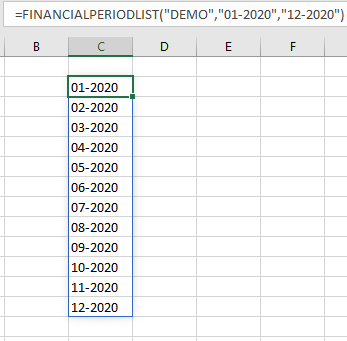FINANCIALPERIODLIST function
Created by Harry Lewis, Modified on Fri, 21 Feb at 6:14 AM by Grigorii Kosianenko
Applies to
GL Module
ERP: Acumatica, CEGID, Haufe x360, JAMIS Prime, MYOB Acumatica
Description
The FINANCIALPERIODLIST function returns an expanded list of financial periods defined in the system, optionally bounded by the specified period boundaries.
Velixo recommends the use of Microsoft 365 for this feature. Experimentally, Excel 2010 or higher may be used. See the Prerequisites for additional information. |
TABLE OF CONTENTS
Syntax
FINANCIALPERIODLIST(Connection, FromPeriod, ToPeriod, ShouldIncludeAdjustmentPeriods, SortOrder, Company)
Parameters
The FINANCIALPERIODLIST function uses the following parameters (see our article on filtering Velixo functions):
Parameter | Required/ Optional | Description |
Connection | Required | The name of the connection, as specified in the Connection Manager |
FromPeriod | Optional | The STARTING financial period (inclusive) in the MM-YYYY format |
ToPeriod | Optional | The ENDING financial period (inclusive) in MM-YYYY format. |
ShouldInclude | Optional | TRUE / FALSE value indicates whether the defined adjustment periods should be included in the displayed list. |
SortOrder | Optional | The order in which the financial periods will be listed: 1 = Ascending 2 = Descending |
| Company | Optional | The ID of the company whose financial calendar is to be used for determining the results. This parameter is used when the Multiple Calendar Support feature is enabled within Acumatica. The company financial calendar of the specified company will be used. If left blank, the Master Financial Calendar will be used. |
Examples
Example 1 - Both period parameters included
=FINANCIALPERIODLIST("Demo", "01-2020", "12-2020", , 1)Description: Displays the financial periods (in ascending order) between the first and twelfth periods of the 2012 financial year (inclusive), including any adjustment periods.
Result:


Example 2 - No starting period
=FINANCIALPERIODLIST("Demo", , "02-2018")Description: Displays a list starting with the first financial period defined in the system and ending with the second financial period of 2018, including adjustment periods.
Result:

Note: The adjustment period 13-2017 is included.

Example 3 - Exclude adjusting period
=FINANCIALPERIODLIST("Demo", , "02-2018", FALSE)Description: Displays a list starting with the first financial period defined in the system and ending with the second financial period of 2018, excluding the adjusting period.
Result:

Note: The adjustment period 13-2017 is not included

Example 4 - No ending period
=FINANCIALPERIODLIST("Demo", "10-2019")Description: Displays a list starting with the tenth period of 2019 and ending with the last financial period defined in the system.
Result:


Example 5 - List periods across columns
=TRANSPOSE(FINANCIALPERIODLIST("Demo", "01-2018", "12-2018", FALSE))Description: Use the Excel TRANSPOSE function to display the financial periods 01 through 12 of the year 2018 across columns
Result:

Example #6: No periods included
=FINANCIALPERIODLIST("Demo")Description: Displays all financial periods defined in the system
Result: All financial periods defined in the system will be displayed
Was this article helpful?
That’s Great!
Thank you for your feedback
Sorry! We couldn't be helpful
Thank you for your feedback
Feedback sent
We appreciate your effort and will try to fix the article